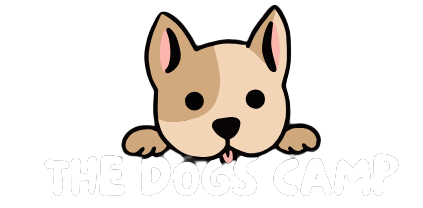Cocker Spaniel and Dachshund: Docker Dog Breed Information
Known for their friendly nature and suitability for homes with children, Docker Dogs make for loving companions. Owners should monitor their health, as the breed can inherit certain conditions, making regular vet visits necessary.
These dogs are happy in smaller homes but need daily walks or playtime to burn off their energy. Grooming needs may vary depending on the coat they inherit from their parents, but it’s usually manageable.
In summary, the Docker Dog is a friendly and adaptable breed with a maintenance level that’s relatively easy to handle.
Key Takeaways
- Docker Dogs are a Dachshund and Cocker Spaniel mix.
- They are friendly and ideal for family living.
- Regular vet check-ups and daily exercise are essential.
Quick Facts
The Docker may not be a recognized purebred, but it’s gained popularity as a mixed breed dog from crossing a Dachshund with a Cocker Spaniel.
Known for their friendly personality and manageable size, Dockers are a hit with those who appreciate the best qualities of both parent breeds.
They’re usually small to medium dogs, tipping the scales at about 20-25 pounds and standing around 9-13 inches tall. This size range makes them an excellent fit for various living spaces, whether a cozy apartment or a house with a spacious backyard.
Expect a Docker to be your loyal friend for 12 to 15 years. These dogs are known for their social temperament, making them great pets for single families, including those with kids and seniors.
Their adaptability is a testament to the successful combination of the Dachshund and Cocker Spaniel lineage.
Docker Dog Pictures
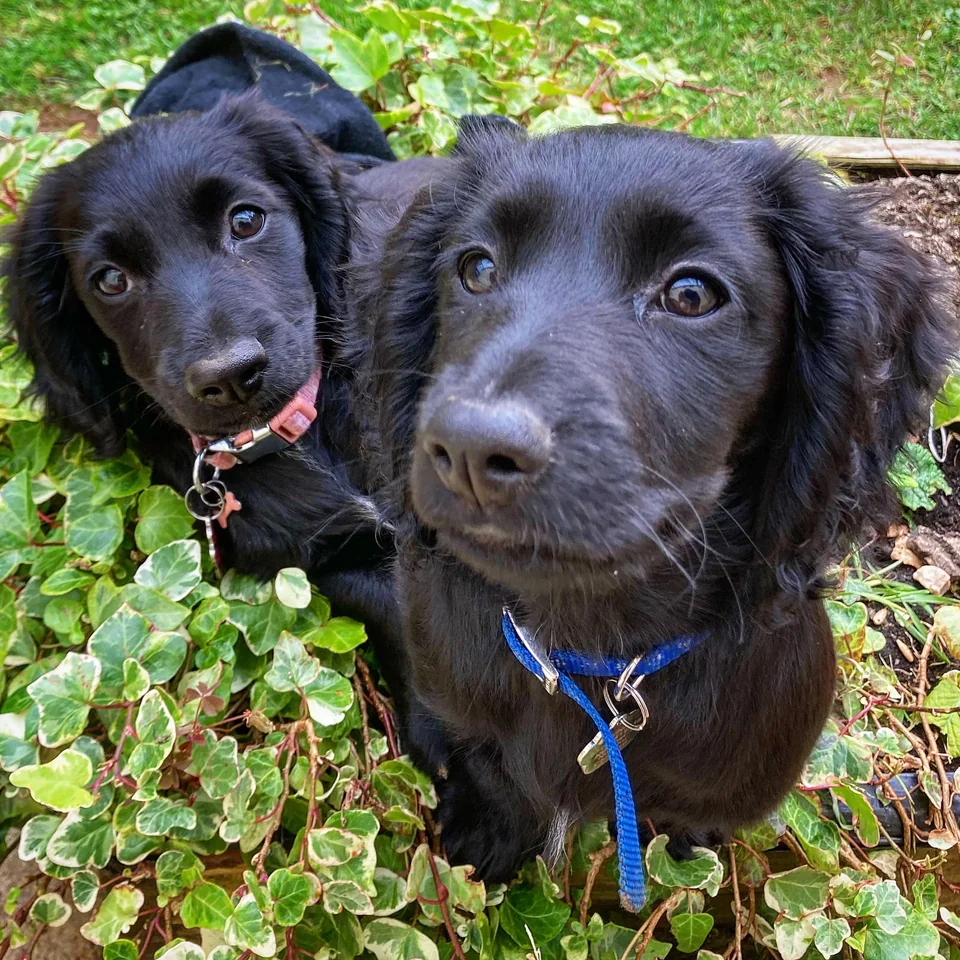
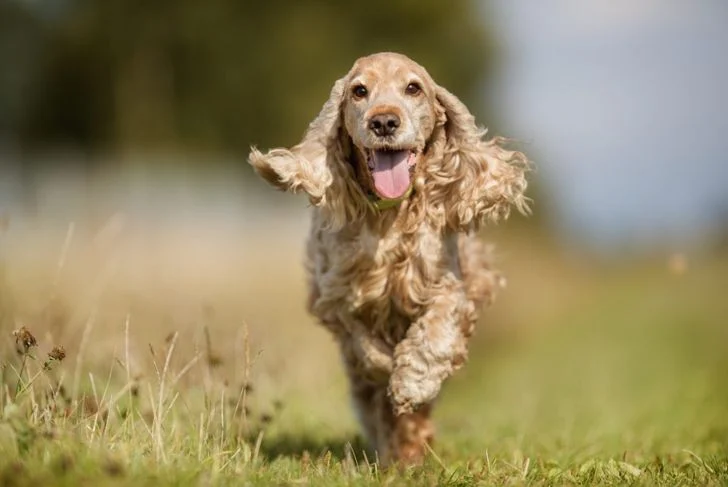

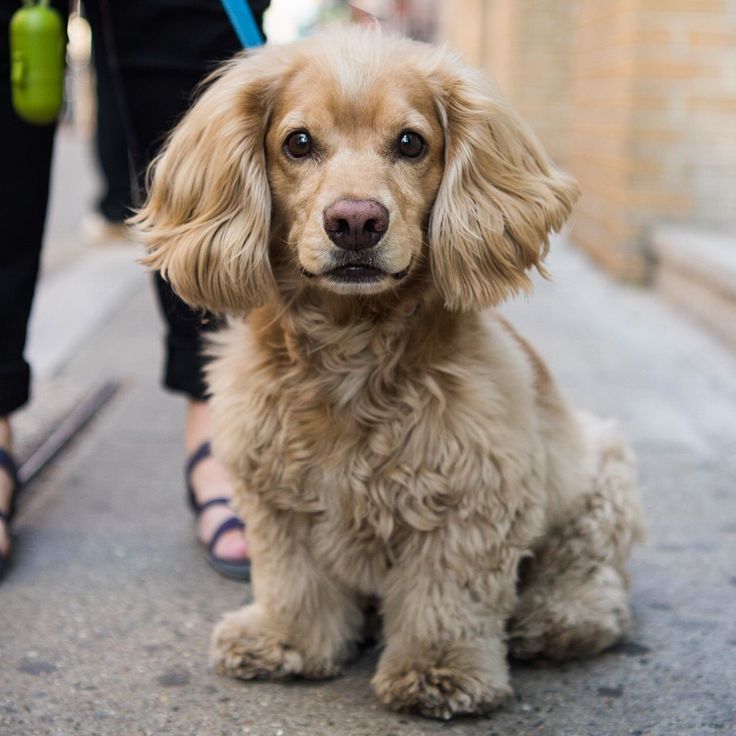
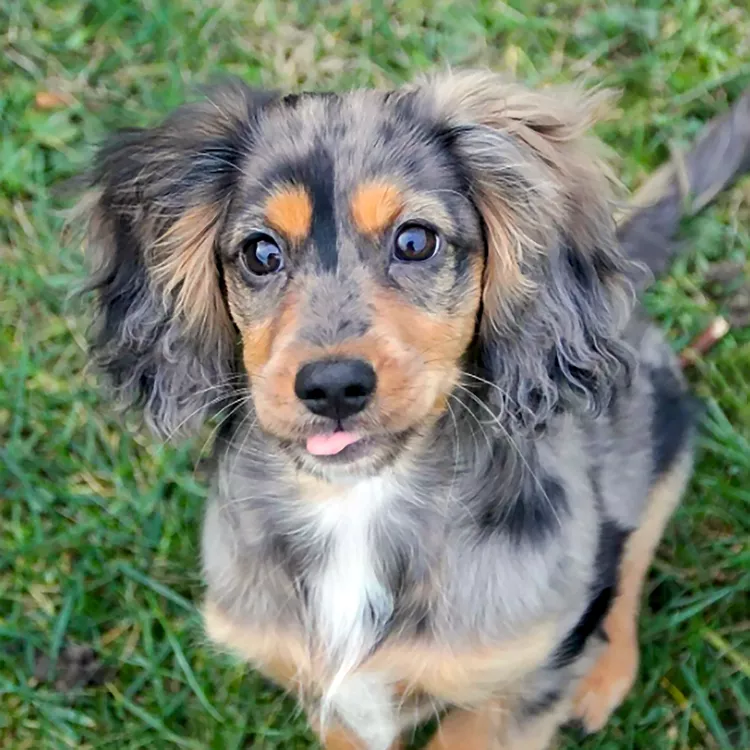
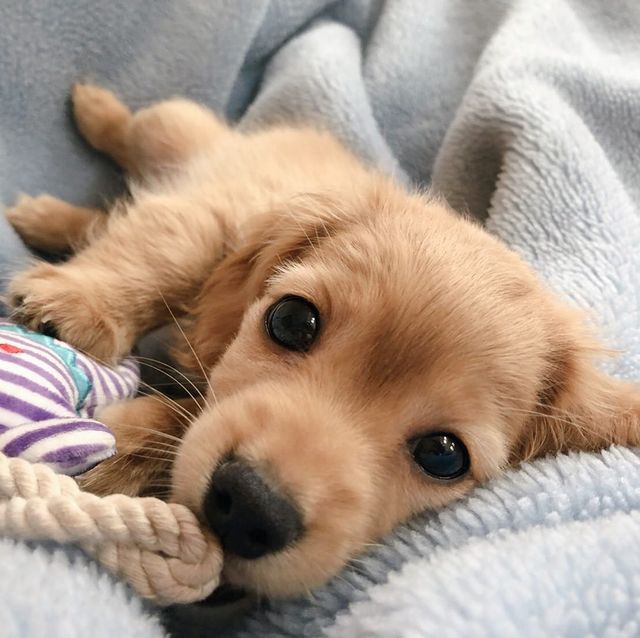
Overview
Originating from the deliberate crossbreeding of Dachshunds and Cocker Spaniels, Docker dogs embody a versatile mix of traits suitable for various household environments. As a designer breed, Dockers merge the elongated body of the Dachshund with the softer, wavier coat of the Cocker, creating a distinctive appearance that varies but frequently presents in hues of red, black, brown, or tan.
These mixed-breed dogs, averaging 25 pounds and reaching up to 12 inches in height, offer a compact size that adapts well to apartment living. Known for their amiable and sweet-natured disposition, Dockers make excellent companions, displaying a well-suited temperament for novice and experienced dog owners. They exemplify the sought-after balance between affectionate sociability and manageable size that many seek in a pet.
Breed Information and Characteristics Summary
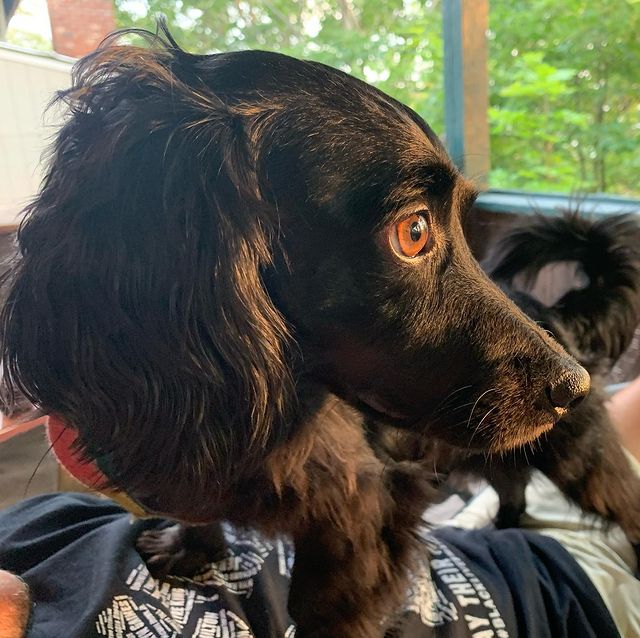
Docker dogs are charming hybrids that combine the unique body shape of a Dachshund with the soft, varied coat of a Cocker Spaniel. They come in a lovely red, black, brown, or tan mix, often paired with another color.
These small to medium-sized dogs are known for their gentle temperament, perfect for families, even those with children and other animals. They’re especially suited to those new to dog ownership.
In terms of their traits, Docker dogs are influenced by their Dachshund and Cocker Spaniel ancestry. They’re friendly and adaptable, mainly from the Cocker Spaniel side. Regarding staying active, they require daily walks or playtime, a trait they inherit from the Dachshund and the Cocker Spaniel.
Health-wise, owners should be aware of potential issues like hip dysplasia and eye conditions, which are common concerns for both parent breeds. To keep them healthy and happy, Docker dogs need regular exercise, consistent grooming, and periodic vet visits to avoid any inherited health problems.
Breed Origin Story
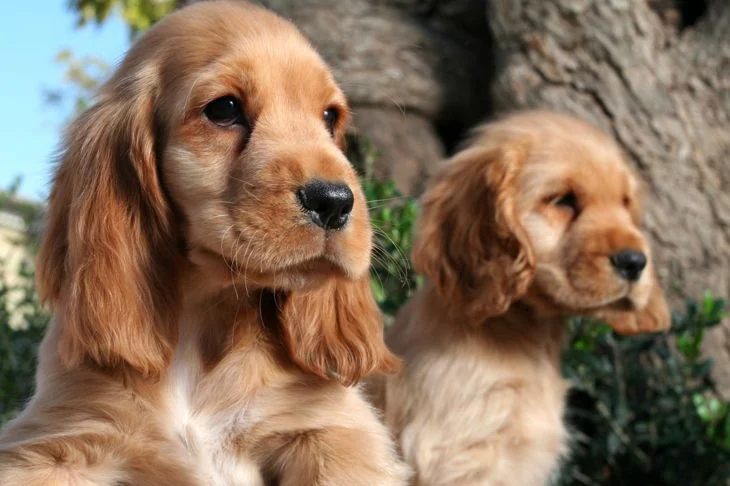
The Docker dog is an intriguing mix, born from the intentional breeding of the Dachshund and the Cocker Spaniel. This cross aimed to combine the best traits of both breeds, leading to the Docker’s unique qualities and rising appeal among dog lovers.
The history behind the Docker involves understanding the origins of both Dachshunds and Cocker Spaniels, each breed with its purpose and place of birth. The Docker’s lineage is a clear testament to the careful selection and breeding that has marked its relatively recent development.
This breed is increasingly recognized by dog clubs and registries, reflecting its status as a beloved pet.
Hybrid Breed Roots
The Docker, sometimes called the Spaniel Doxie, is a mix of Dachshund and Cocker Spaniel that has gained popularity for its unique blend of features.
Breeders were inspired to combine the distinctive long-bodied shape of the Dachshund with the friendly nature and athleticism of the Cocker Spaniel. They aimed to create an affectionate pet, easy to train and suitable for various home settings.
Dockers inherit diverse traits, such as different coat types and the characteristic floppy ears from their Spaniel ancestors.
Parent Breeds History
To understand the background of the Docker dog, it’s essential to know about its ancestors, the Dachshund and the Cocker Spaniel.
Originating from Germany in the 1500s, the Dachshund was bred to hunt due to its sharp sense of smell, short legs, and persistent nature. It became a favored pet by the 1800s.
The Cocker Spaniel began in 19th century England, crafted for the specific purpose of hunting birds. The American Cocker Spaniel was officially acknowledged as a separate breed from the English Cocker Spaniel in 1945.
The creation of the Docker is a modern venture that merges the remarkable qualities of its parent breeds, creating a new and distinct narrative for itself.
Dockers’ Ancestral Timeline
The Docker breed is a distinctive mix of its parent breeds, the Dachshund and the Cocker Spaniel. These dogs bring together the best features for both friendship and active lifestyles.
Dockers get their robust body and sharp tracking abilities from the Dachshund, bred in Germany during the 1500s for hunting dog. On the other hand, the Cocker Spaniel, which came into prominence in England during the 1800s for bird hunting, gives the Docker its friendly and pleasant nature.
The American Cocker Spaniel was officially recognized as a separate breed in 1945, adding more depth to the Docker’s family tree. With their mixed heritage, Dockers have a set of characteristics and needs from their Dachshund and Cocker Spaniel ancestors. They need a care and exercise plan that respects their unique background.
Physical Dimensions
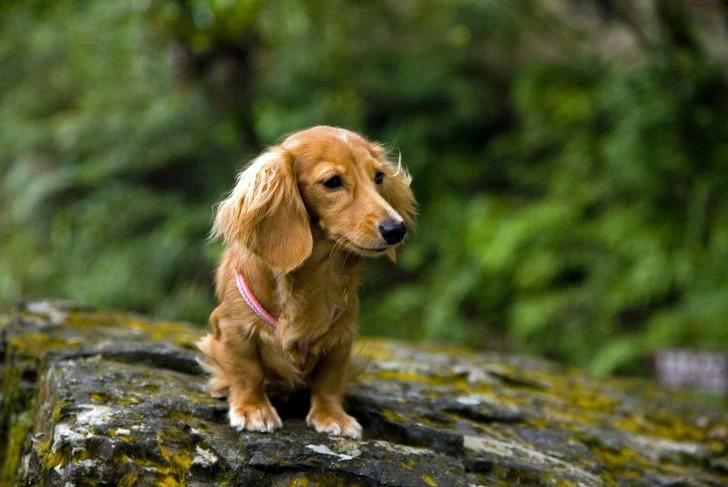
When looking at the size and shape of Docker Dogs, it’s helpful to know different aspects that make up their build and health. These factors clearly show what makes Docker Dogs stand out and help future owners understand what kind of care and space these dogs need.
Let’s break down the key physical features of Docker Dogs:
Docker Dogs typically have a height that varies within a specific range. Their weight is another crucial aspect that influences their diet and exercise needs. They have a distinctive body shape that reflects the characteristics of their parent breeds. When you compare them to other dog breeds, you’ll notice differences in size that are worth considering.
Average Height Range
Docker dogs, with their compact size, typically stand between 9 and 13 inches tall. Their well-proportioned build suits a variety of living situations, from small apartments to larger homes.
These dogs have a medium-sized frame and a distinctive long body, traits inherited from their dachshund lineage. The convenient height of Docker dogs makes them easy to handle and suitable for various indoor spaces while still maintaining their role as affectionate companions and alert watchdogs.
Their adaptable size is one reason many dog enthusiasts favor them.
Weight Considerations
Docker dogs, which are small to medium-sized, usually tip the scales at 20 to 25 pounds. To keep them healthy, a balanced diet and regular exercise are essential.
Owners must watch their Docker’s food intake to prevent them from becoming overweight, which can cause serious health issues. Feeding them an amount that matches their activity level is vital to ensure they get their daily dose of physical activity. Exercise helps them stay fit and keeps their minds sharp.
Regular check-ups with the vet are essential to monitor their weight and tweak their diet and exercise routine if needed. Careful attention to how many calories they eat and a steady exercise schedule are the secrets to a Docker dog’s ideal weight, health, and long life.
Body Shape Traits
Docker dogs have a unique body shape that blends traits from their parent breeds. Their elongated bodies nod to their dachshund ancestry, designed for digging and getting through tight spaces quickly. At the same time, their heads take after the cocker spaniel, giving them a friendly and approachable look.
These charming dogs stand on short legs, which means they’re closer to the ground – a design inherited from the Dachshund’s burrowing instincts. Their floppy ears, a trait of the cocker spaniel, not only add to their appeal but also require regular cleaning to keep them healthy and free from infections.
As a Docker owner, it’s wise to stay alert for any signs of spinal issues like Intervertebral Disk Disease, which is more common in breeds with long backs. Regular vet check-ups will help ensure your Docker stays active and healthy. Keeping an eye on their spinal health is essential for preventing mobility problems that could impact their quality of life.
Size Comparison
Docker dogs are known for their small to medium size, generally weighing 20-25 pounds and standing 9-13 inches tall at the shoulder. This makes them a perfect fit for the small dog category, quite different from the much larger mastiff mix breeds that can tip the scales at over 100 pounds.
Despite their mixed-breed heritage, which introduces some size variability, adult Docker dogs maintain a consistent size due to their genetic makeup. Their compact build makes them versatile for different living situations, whether a spacious house or a cozy apartment.
Growth Chart Reference
While Docker dogs don’t have an official growth chart, you can predict your puppy’s size by looking at the average sizes of the Dachshund and the Cocker Spaniel. Estimations suggest a Docker will likely weigh between 20 and 25 pounds and stand about 9 to 13 inches tall.
To help your Docker thrive and avoid health issues, it’s wise to start socialization early and stick to a consistent care routine. Although there isn’t a specific growth chart for Dockers, monitoring their weight and height progress and regular vet check-ups can help maintain their health and prevent common problems like obesity, a concern for both parent breeds.
Temperament Traits
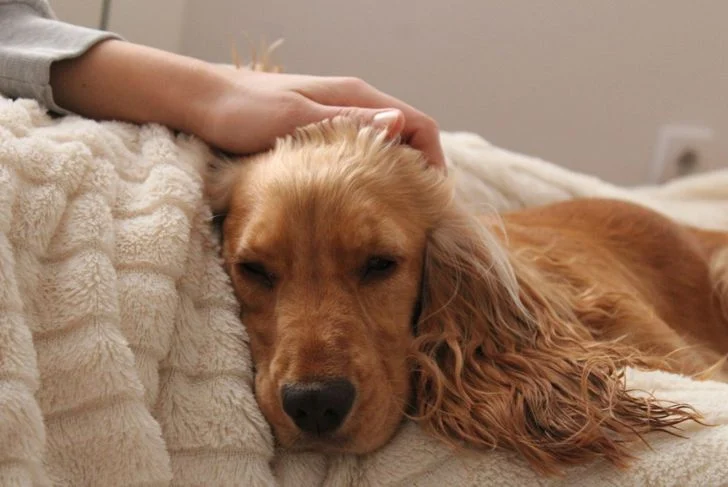
Docker Dogs are known for their affectionate and loyal behavior, forming strong bonds with their families. They also possess a high energy level, requiring plenty of play and exercise to stay happy.
While these dogs love their human companions, they have an independent side that might make training challenging, but they can learn effectively with patience. They are typically alert and watchful, often greeting newcomers with a friendly demeanor.
Affectionate Family Companions
Docker dogs are known for their warmth and loving nature, making them perfect pets for homes with children or adults alike. These dogs come from the Cocker Spaniel breed, known for their friendly behavior and tendency to form close bonds with family members.
A Docker’s personality is a mix of fun-loving spirit and calmness, ensuring they fit well within various home settings. They adapt well and become loyal friends regularly when introduced to new people and environments.
This combination of traits from their Cocker Spaniel heritage and more extensive breed mix creates a well-rounded, approachable, and dignified dog.
Energetic Playful Nature
Docker dogs are known for their boundless energy and love for play, needing plenty of exercise to stay happy and well-behaved. A good routine for them includes 45 to 60 minutes of intense daily activity.
These dogs have a strong instinct to chase tiny animals, so keeping an eye on them is best. Playing fetch is a perfect way to satisfy their chase drive and keep their bodies and minds sharp.
When training Docker dogs, being patient and consistent is essential to make the most of their intelligent and friendly nature.
Stubborn Streak Challenges
Training a Docker dog can be tricky due to their stubborn nature, which comes from their Dachshund heritage. This strong-willed behavior can make house training a bit of a challenge. To overcome these obstacles, positive reinforcement is critical, rewarding good behavior and encouraging repetition.
Docker dogs also need plenty of exercise and mental stimulation to avoid becoming anxious or developing unwanted behaviors. Socializing them early and keeping training sessions short and sweet can help manage their natural urge to chase.
You can guide your Docker dog to become a well-behaved companion with patience and consistency.
Friendly With Strangers
Due to their Dachshund heritage, Docker dogs might have a stubborn streak, but they’re still welcoming and outgoing with new people. This friendly behavior is enhanced by their Cocker Spaniel side, which brings a strong desire to please and a warm, loving nature that they gladly extend to others, not just their family.
Even if they’re a bit cautious initially, Dockers generally warm up quickly, showing they can be pleasant in various social situations. Proper training and exposure to different people can help ensure their initial hesitation gives way to their love for making new friends.
Alert, Watchful Behaviors
Docker dogs naturally possess a sharp sense of vigilance that protects their homes and loved ones well. These dogs are always attentive and on the lookout, showing an impressive awareness of their surroundings.
Their intelligence is critical in their ability to size up a situation and act quickly when needed. Docker dogs often have a strong instinct to chase, a sign of their inherent alertness, especially when they spot smaller creatures.
To ensure these dogs act appropriately in various situations, they must be provided with consistent socialization and training. Their willingness to learn and adaptability make them excellent obedience training candidates, further sharpening their natural guarding skills.
Common Health Concerns
When caring for Docker Dogs, owners and vets must focus on health concerns to ensure the dogs live long, healthy lives. Proactive steps such as genetic screening and preventative care are vital.
Owners should maintain a healthy weight for their dogs to prevent obesity, and vets should regularly check for signs of diabetes and thyroid issues. It’s also essential to conduct urinary tract exams routinely and have a strategy for pinpointing and managing allergies.
These actions are critical to improving the well-being- of Docker Dogs.
Genetic Disease Risks
Docker dogs are crossbreed dogs that often face health challenges like hip dysplasia and intervertebral disk disease due to their Dachshund and Cocker Spaniel heritage. These health issues are serious; hip dysplasia can lead to painful arthritis, and disk disease might result in nerve damage or paralysis.
Diabetes is another condition that can affect them, requiring careful management to prevent additional health problems. To catch these issues early, regular check-ups with a vet are essential.
Ensuring that breeding practices are ethical and include genetic testing can help lower the risk of these diseases in Docker dogs.
Obesity Management
Managing obesity is critical for Docker dogs to maintain a healthy life. This breed is prone to weight issues, which can worsen their genetic health problems.
Docker dogs, the offspring of Dachshunds and Cocker Spaniels, need diets designed explicitly for their energy levels. Daily exercise is also vital to help prevent obesity, a common problem for these dogs.
Regular check-ups with a vet are necessary to monitor their health and adjust their diet when needed. A strict feeding schedule that avoids too many treats and follows veterinary guidance will help keep Docker dogs healthy and vibrant.
Regular Health Screenings
Aside from focusing on diet, regular health screenings are vital for Docker dogs to prevent and manage their genetic health issues.
Your vet should regularly check for common conditions like intervertebral disk disease, diabetes, and epilepsy, as well as urinary tract problems, allergies, and hypothyroidism.
Hip dysplasia, autoimmune hemolytic anemia, and eye conditions are also concerns for Docker dogs.
Early detection of these problems through consistent veterinary exams can help with timely treatment, improving the dog’s overall well-being.
Genetic tests and careful breeding can reduce the incidence of these hereditary issues.
Grooming and Maintenance
Grooming and maintenance play a vital role in keeping Docker dogs healthy. A well-thought-out routine tailored to their needs will help maintain their coat and skin health.
Regular brushing helps reduce loose fur and prevents tangles.
A consistent bathing schedule is paramount to preserving the coat’s natural oils.
Keeping their nails trimmed is essential to prevent painful splitting or overgrowth.
Also, a routine for ear cleaning is essential to stave off infections and keep their hearing sharp.
These steps are fundamental for your dog’s comfort and health, and integrating them into your routine will make the process smoother for you and your pet.
Brushing Frequency
Caring for Docker dogs involves daily brushing to maintain their long, dense coats. Their spaniel heritage often blesses them with thick, sometimes curly hair that can easily mat if not regularly groomed. It’s vital to take a few minutes daily to detangle their fur and remove loose hair.
Dental hygiene is also vital to a Docker dog’s care routine. Brushing their teeth a few times per week helps prevent gum disease.
A consistent grooming routine, including ear cleaning and nail trimming, is essential for the overall health of Docker dogs.
Bathing Routine
Creating a bathing routine for your Docker dog starts with understanding their unique coat and how active they are. Choose a shampoo gentle enough for their soft, silky fur to keep it shiny without bathing so often that you dry out their skin. It’s all about striking the right balance to avoid stripping away the coat’s natural oils.
Regular grooming is more than just bath time; it includes brushing their coat to remove loose hair and promote skin health. Don’t forget to clean their ears, clip their nails, and brush their teeth.
Regular vet visits will help you keep track of your dog’s health, ensuring their grooming routine is on point for their happiness and health.
Nail Trimming Tips
Caring for your Docker dog’s paws includes trimming their nails regularly to avoid overgrowth, which can lead to discomfort. Use dog-specific nail clippers and learn how to cut them to keep your pet comfortable.
Avoid cutting the quick of the nail, as it can be painful and may cause bleeding. Get your Docker used to nail trimming by frequently handling their paws and showing them the clippers without cutting at first.
When unsure about the correct trimming method or how short the nails should be, it’s wise to get advice from a veterinarian or a professional groomer. Keeping your Docker’s nails well-trimmed is integral to their grooming routine.
Ear Cleaning Guide
Ear care is vital for maintaining your Docker dog’s well-being, as their heritage from Cocker Spaniels makes them more susceptible to ear problems. Their floppy ears can trap moisture, making them a breeding ground for infections.
It’s best to use ear-cleaning solutions for dogs to keep their ears clean and healthy. These solutions are great for breaking down earwax and clearing out dirt.
When cleaning your dog’s ears, handle the inner ear gently to avoid causing any harm. Instead of cotton swabs, use cotton balls or gauze to clean around the entrance of the ear canal.
Daily ear cleaning is a good practice for dogs with long hair to prevent any issues from arising.
Shedding Management
Shedding management is critical when caring for Docker dogs because it keeps their coats in good condition and prevents matting. Docker dogs, with their Cocker Spaniel and Dachshund heritage, may have coats of varying lengths, which affects how much they shed.
Regular brushing at least once a week is recommended to manage shedding effectively. Dogs with longer hair, a trait they may get from the Cocker Spaniel side, often must be groomed daily. This routine does more than remove loose hair; it also spreads the dog’s natural skin oils, which keeps the coat looking shiny and healthy.
Including ear cleaning and nail trimming in your grooming schedule is essential for maintaining your Docker’s cleanliness. Keeping up with these practices makes Dockers a preferred choice for those who want a loving pet without overwhelming grooming needs.
Dietary Requirements
When planning meals for Docker dogs, choosing foods that offer balanced nutrition is vital. Opt for foods high in protein and low in grains to suit their energetic needs. Be mindful of any allergies to prevent adverse health effects. Stay aware of and avoid ingredients that may cause allergic reactions in Docker dogs. Regular feeding is vital to support your dog’s health and happiness. Set a consistent feeding routine to help prevent issues like overeating and obesity. Keep an eye on your dog’s diet and make necessary changes to meet their changing nutritional requirements as they grow.
Ideal Food Types
Docker dogs thrive on a specialized diet that includes nutrient-dense kibble suitable for medium-sized breeds. These energetic pets need a diet supporting their joints, so look for food containing glucosamine and chondroitin.
A balanced mixture of proteins, fats, carbohydrates, vitamins, and minerals is vital for their overall well-being. Always opt for a high-quality dog food brand that adheres to the standards set by the AAFCO to ensure your Docker’s diet is beneficial for their health and energy levels.
Allergy-Specific Diets
Allergy-specific diets are essential for the well-being of Docker dogs with genetic allergies and sensitivities. To determine the right food for these dogs, you must evaluate their needs, including their specific allergies, weight, activity levels, and other health issues. A veterinary nutritionist can help design a diet that minimizes allergic reactions while ensuring the dog gets all the necessary nutrients.
When creating an allergy-specific diet, choosing the right ingredients and avoiding anything that might trigger an allergic reaction is essential. Regular check-ups and diet adjustments are important as the dog ages or lifestyle changes. Following a diet plan set by a vet is vital to keep your Docker dog healthy and happy.
Feeding Schedule Importance
Feeding schedules are vital for Docker dogs to meet their nutritional requirements and maintain overall health. These energetic dogs must eat regularly to avoid weight gain and keep their energy up.
Consulting with a veterinarian will help tailor a diet to a dog’s needs, considering factors like weight, activity level, and overall health. As Docker dogs age, their food needs to change to support their metabolism.
It’s wise to avoid letting your dog eat anytime they want, which can lead to overeating. Sticking to a regular feeding routine, a healthy diet, and consistent exercise are vital to keeping a Docker dog in great shape.
